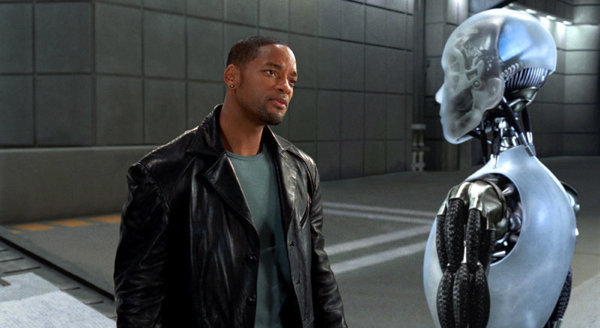Movie review by Greg Carlson
Nobody is going to mistake “I, Robot” for either great storytelling or important filmmaking. The film’s director, Alex Proyas, honed his skills while making sumptuous (but empty-headed) eye candy like “The Crow” and “Dark City.” Like those movies, “I, Robot” is long on style, short on ideas. The film’s lack of brainpower is a real shame, however, considering that its basic source material – courtesy of Isaac Asimov’s stories dealing with the Three Laws of Robotics – should have fueled weightier ruminations on technology, humanity, and artificial intelligence. Instead, audiences are left with a noisy action cop movie filled out with car chases, explosions, and mobs of computer-generated metal men battling humans in hand-to-hand combat.
Del Spooner (Will Smith) is a tough Chicago police detective in 2035, and unlike the rest of the human population, he does not trust the robots who toil as the servants, employees, and companions to their flesh and blood masters. Robots, we are told more than enough times in the first act, are incapable of harming people, but Spooner has a hunch that the latest wave of product to roll out of the Microsoft-esque U.S. Robotics Corporation is coming awfully close to erasing the line between human and nonhuman. Of course, the reasons for Spooner’s extreme prejudice against walking, talking machinery will be revealed (as a virtual afterthought) later in the movie. As for the potentially interesting subject of race relations, “I, Robot” remains silent.
While investigating the death of an old friend – a research scientist (James Cromwell) who worked for U.S. Robotics – Spooner becomes increasingly convinced that the man’s killer was a robot. Naturally, this utterly defies existing logic, which places Spooner at odds with his boss (Chi McBride) as well as Dr. Susan Calvin (Bridget Moynahan), another U.S. Robotics scientist with an unshakable faith in the Three Laws. Things begin to get interesting when Sonny (Alan Tudyk), the robot suspected of murder, demonstrates that not only can he think for himself, he also has the ability to dream and exhibits the characteristics of free will.
Is Sonny good or evil? What secrets do U.S. Robotics and its sinister CEO Lawrence Robertson (Bruce Greenwood) want to keep? “I, Robot” is too focused on its own slam-bang action sequences to expend much effort addressing these and other more challenging questions and ideas. When the movie does get around to considering the implications of whether or not there are ghosts in the machine, it flickers with the sort of excitement one feels when thinking about a superior film, like “2001: A Space Odyssey.” Sonny is not afforded enough screen time to really dig in to the ethics of his treatment by others. He wants to be loved, but he doesn’t understand why he wants to be loved.
Sonny’s dilemma might have been the subject of another movie altogether, but the demands of 20th Century Fox’s marketing strategists remain resolutely focused on delivering a “product” that resembles hits we’ve seen before, from “The Matrix” to “Robocop.” “I, Robot” resembles those two movies more than “2001,” and it is too bad it could not have existed in a happy medium. Doing sci-fi is easy, but doing sci-fi well is difficult. Even Spielberg’s somber, overlong “A.I.” failed to improve on Kubrick’s earlier work. Someday, somebody will make a great film about machines crossing over into consciousness. “I, Robot” is not that movie.
